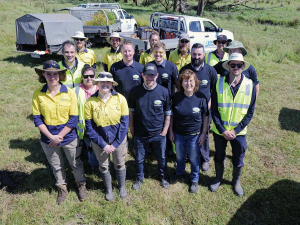Another Windfall for Fonterra Farmers, Unit Holders
Fonterra farmer shareholders and unit holders are in line for another payment in April.
 Fonterra has kicked off its spring vegetation project, planting 20,000 native plants and trees across four hectares to form a riparian zone around its Darnum plant in Victoria.
Fonterra has kicked off its spring vegetation project, planting 20,000 native plants and trees across four hectares to form a riparian zone around its Darnum plant in Victoria.
Leading in sustainability is central to Fonterra’s strategy, both here and overseas, the co-operative claims.
The co-operative says that’s how it creates long-term value for the business and generations to come.
“We’re making sustainable improvements right across our business, including how we care for the ecosystems surrounding our manufacturing sites,” it says.
These improvements are not limited to New Zealand. In Gippsland, Victoria, Fonterra’s Darnum site is located on a 280-hectare property, of which only around 6% is used for manufacturing.
It’s here that the co-op kicked off its spring vegetation project, planting 20,000 native plants and trees across four hectares to form a riparian zone.
Paul Winfield, Fonterra’s environmental manager at Darnum, says that re-vegetation projects like these play an important part in protecting and nurturing the ecosystems surrounding its site.
“We want to ensure that we’re producing dairy nutrition in a way that cares for the environment, and part of this is caring for the land around us.
“To make this happen, we’ve partnered with Habitat Creations, a local family-owned company that specialises in conservation, land management and native plant supply via its Wholesale Nursery.
“While the high volume of rainfall we’ve had over the past couple of months delayed the start, it’s great to finally break ground and get the project underway,” says Winfield.
Using plants grown from local provenance seeds, Habitat Creations – along with some people from our site – took on the task to plant out the riparian area.
Michael Shore, general manager at Habitat Creations, says that planting a diverse mix of tall canopy trees and understory species complements the existing native plants already on site.
“These plants and trees will help absorb nutrient run-off and prevent it from getting into the waterway, and will also have significant advantages for local biodiversity – creating a habitat, refuge, and a corridor for wildlife movement to the neighbouring wetlands.
“When fully planted, this area will also have the potential to sequester significant amounts of carbon which will help reduce levels of CO2 – we estimate up to forty tonnes every year over a 25-year period,” says Shore.
This spring vegetation project is just one of many environmental initiatives taking place at Fonterra’s Darnum site.
The co-op has just started introducing solar energy to sites by commissioning a 66kw solar system on the administration building.
Agrisea NZ has appointed Craig Hudson as it's new chief growth officer.
State farmer Landcorp, trading as Pamu, is a forecasting a full-year net profit of around $100 million.
Tony Aitken, chief executive of Ruralco, has been awarded the Excellence in Business Leadership Award at the ANZ Business of the Year Awards.
Global trade has been thrown into another bout of uncertainty following the overnight ruling by US Supreme Court, striking down President Donald Trump's decision to impose additional tariffs on trading partners.
Controls on the movement of fruit and vegetables in the Auckland suburb of Mt Roskill have been lifted.
Fonterra farmer shareholders and unit holders are in line for another payment in April.
OPINION: Staying with politics, with less than nine months to go before the general elections, there’s confusion in the Labour…
OPINION: Winston Peters' tirade against the free trade deal stitched with India may not be all political posturing by the…